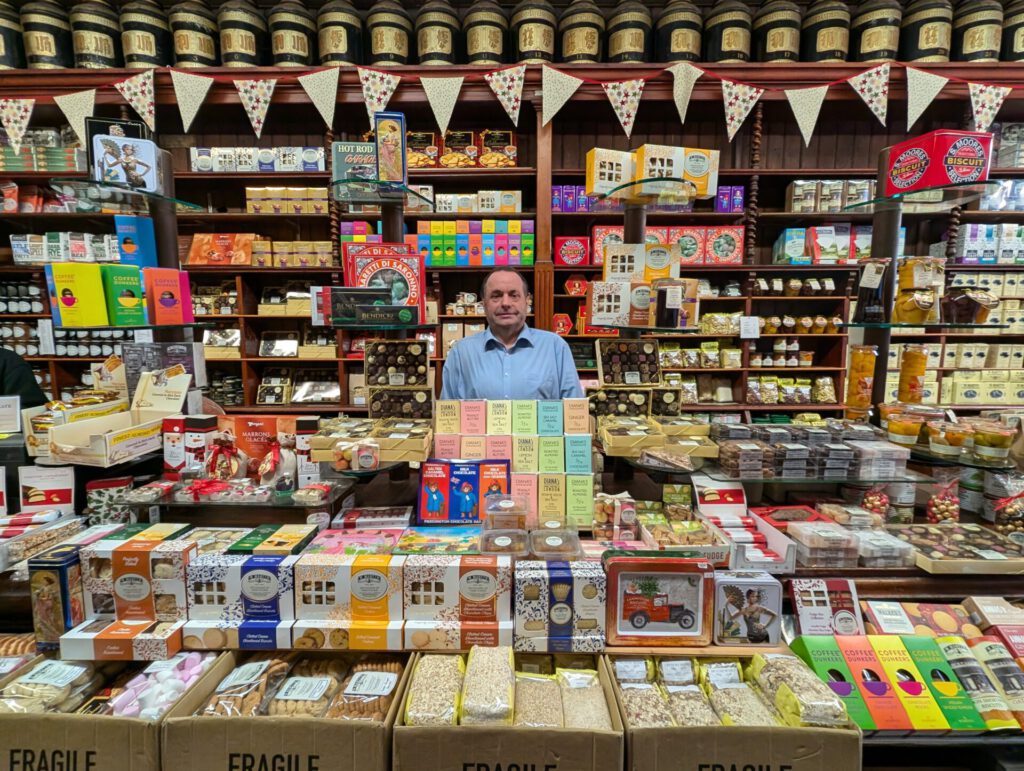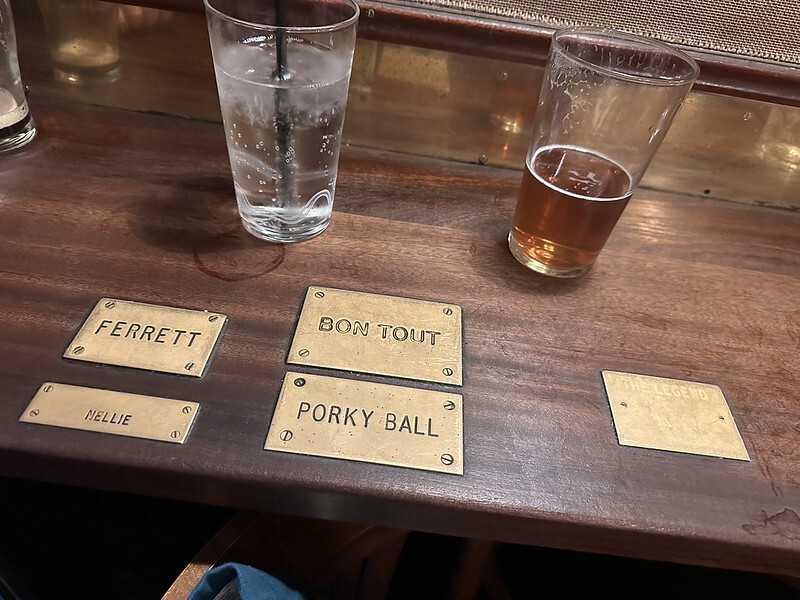“Customers love coming in and saying ‘Oh Mr Martyn, I smelt that down by the bus stop this morning!’ They tell us how far away they can smell the coffee.”
The gas-fired Uno roaster spinning in the window of W Martyn on Muswell Hill Broadway — Colombian beans rattling away like a pair of maracas — is one of London’s great advertisements. Installed in the 1950s, it was getting on for a museum piece even back then, but who knows how many customers have since been lured into the shop by this old war horse’s noisy window show, the earthy aroma of gas-heated coffee.
“If things go wrong, we have parts made for it, but touch wood it very rarely goes wrong,” says William Martyn — the fourth William in a line of grocers who’ve worked in and owned this shop. “That’s Costa Rica done,” he adds, as the Uno winds down.
They don’t make ’em like they used to. W Martyn inhabits a space in time that has long eluded London’s high streets. The wooden shelves with their barley-twist posts are original, as are the wooden drawers behind the counter labelled ‘Baby Figs’ and ‘Vostizza Currants’, and the half-barrels which bulge out behind them. A jar of sugar mice sits on the counter by a pair of golden scales with mirrors on each side, still used to meter out produce. “There used to be a lady called Peggy — she was the height of the mirror, and she’d look in that mirror this side to see the customers coming in the front door,” says William, “and in the mirror on the other side she’d put her make-up on.”
Founded in 1897 by William’s great grandfather, W Martyn was one of the original businesses in the glistening Queen’s Parade, a smart row of gabled shopfronts, originally fitted out with colourful awnings. The first William had a keen nose for business: “Great grandfather used to tip the milkman to let us know if a new customer moved into the area. Then we could send someone out to sell to them,” says William. Across the way at that time, another upstart grocery was trying its luck. It was called Sainsbury’s. W Martyn might’ve become a bigger beast too; there were once two outposts, in Finchley and Golders Green. But Muswell Hill is the only shop that survives — an antidote to the homogeneity of today’s Sainsbury’s et al.
From Domestos to handmade chocolates
The question William is asked most, of course, is: how are you still here?
While the supermarket boom of the 1950s saw ornate glass and glazed tiles ripped out, up and down the country — replaced with Perspex screens, refrigerators and a new ‘serve yourself’ mentality — William’s dad held fast. “Father was never one to change for the sake of changing. And as his tenure here moved on, the shop obviously became more and more special, and then it’d be a mad man to take it out.”
All the usual ‘stepping back in time’ cliches are applicable at W Martyn. But it isn’t entirely unchanged. Tea and coffee was stocked in the early days, but not in great quantities — both were an expensive commodity back then. “We would have sold everything from broom handles, starch, food items, provisions, cheese, butter — the whole thing,” says William, “Everything that a local customer would have wanted.” By the 1920s, tinned produced were being fastidiously arranged into ziggurats (little in the shop is in tins now). Into the 1980s workaday items like cereal and Domestos were sold here, while budding companies, like the chutney-slinging Sharwood’s, used W Martyn as a stepping stone to get themselves on supermarket shelves. “That was a big problem for us, because we’d spend all our time selling the things and then they’d go into supermarkets and we’d lose out,” says William.
Gradually the Martyns expanded their tea and coffee range. Colombian coffee now comes in 70-kilo sacks, a tonne at a time. They’ve also made a point of investing in handmade products; the shelves in 2025 are dressed with granola in paper bags, and lemon & sea salt chocolate bars, made down the road at Diana’s in Hornsey. “Whenever I go on holiday I’m always looking for something different…” William plucks a jar of Stone’s Honey from Dartmoor. “We’re the only supplier in the area.”
Keen pricing (online reviews rave about the value) and a sense of customer service have held the shop in good stead too. “We like the customer who comes in and buys half a pound of dates as much as someone that comes in and spends a fortune,” says William.
Customers of old would have taken a seat by the counter to place their orders, and although that’s no longer the case, there are still echoes of this. “In the past we’ve had customers that have come in — they’re on their own and they’ll sit down and we’ll get them a cup of tea and some biscuits or something.
“They’ll spend 20 minutes, half an hour of their day chatting to us. That’s a big part of what we do. ”
“Every year the shop becomes more special”
As online retail grabs an increasingly thicker wedge of the high street’s business, the internet is a double-edged sword for somewhere as special as W Martyn. In an echo of the 1980s, some bijou companies who used to sell via the Muswell Hill grocery are now cutting out the middle man, selling online from the source. But the internet has also gifted W Martyn with an international audience. “We have customers from across the world who come to see us from time to time. We certainly send our tea and coffee across the UK now,” says William, explaining that they do a strong trade in online sales themselves.
But while plenty of people now coo over W Martyn’s Arcadian aesthetics on Instagram and Facebook, nothing can beat the real thing. “Customers are often delighted to come in, and they bring their friends in — ‘ohh, our friends have never seen this shop!'” says William. At Christmas, the store is inundated with folk buying gifts or ordering hampers packed with teas, jams and chocolates. “I must admit the last two or three years, I’ve been getting a bit like my father now — who passed away in 2018— I’m on the more cautious side,” says William, “‘Are we still wanted in Muswell Hill? Is there a need for us in Muswell Hill?’
“And having had such a wonderful Christmas — we were very, very busy — customers obviously found here what they wanted to find, and we were sending stuff across the UK as well. We’re OK.” Totes and tea towels suggest that, indeed, W Martyn has become something of a boutique tourist attraction.
As the shop’s fourth William mulls over retirement, his son Tom is now primed to come in and take the reins. In the meantime, the vintage Uno roaster continues to whirl, in sync with the sluice of traffic outside. People will occasionally tell William they remember passing the roaster on their way to school, many decades ago. That they loved — or couldn’t stand — the aroma of coffee.
“We have so many local customers that love the shop. It’s part of their lives. Every year the shop becomes more special because it’s another year older.”
W Martyn, Muswell Hill Broadway
All images © Londonist unless otherwise stated










